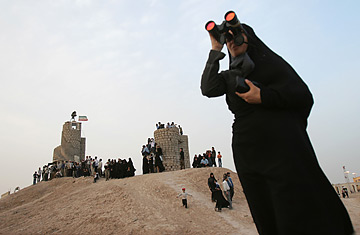
Iranians visit the Iran-Iraq border.
"They say we let the American soldiers have sex with our sisters," says Kareem, rolling his eyes. "We don't shout back."
U.S. officials have lately repeatedly insisted that armor-piercing bombs are being shipped across the border into Iraq along with paramilitary operatives from Iran's secretive Quds Force. But there's little evidence of such an underground railroad in the border areas closest to Baghdad. Kareem and other Iraqi border guards who oversee the territory say there's little border activity at all, if you don't count the occasional jeering from Iranian border guards.
The most common illegal act on the border, according to Iraqi border officials and U.S. troops, is ordinance harvesting. Locals from Iraqi villages along the border have taken to digging up landmines, artillery shells and mortars left scattered around former Iraqi frontline positions from the Iran-Iraq war during the 1980s, gathering unspent explosives and loading them onto donkeys for sale in Iraq's flourishing arms market.
Col. David Sutherland, the commander of U.S. forces in Diyala Province, says 95% of the weapons seized by his soldiers have come from looted stockpiles of the Saddam regime. Still, he keeps a close eye out for weapons traffic from Iran. Diyala Province is home to a road network that funnels goods and people from points across the border directly into Sadr City, the Baghdad stronghold of the Mahdi Army militia. Though signs are scant, Sutherland remains certain that Iranian weapons and possibly clandestine operatives move through his territory nonetheless.
"Intuitively and anecdotally, there are things coming in from Iran," says Sutherland. "You have to believe that there are people coming in also."
From driving along the border, it's easy to see how people and goods could enter Iraq undetected. Between the Iraqi outposts like the one manned by Kareem stand large, unwatched areas. And searches of freight trucks from Iran by Iraqi border guards at official road crossings are spotty at best. Sutherland and several of his officers say everyday graft at road crossings along the border in Diyala Province likely allows at least some weapons from Iran to move into Iraq. And the relative ease of forging Iraqi documents would make it easy for Iranians to move back and forth.
"I have no doubt that anything could move across with the right amount of money," says Maj. Ray Litzinger, one of the U.S. soldiers who's worked for the past year with Iraqi forces to tighten the border with Iran. "You just need a sympathizer and some cash in your pocket."
